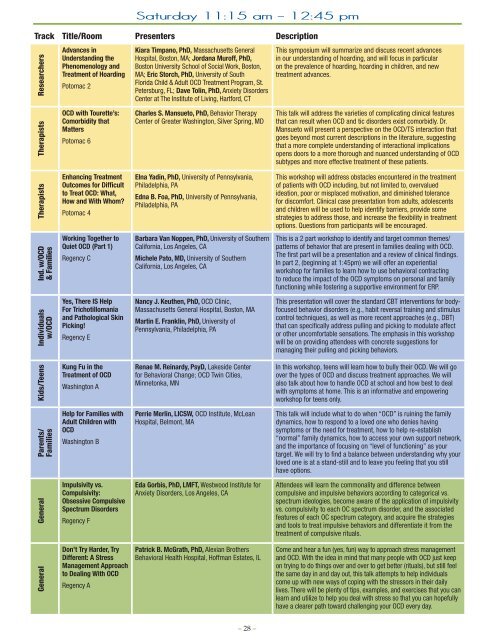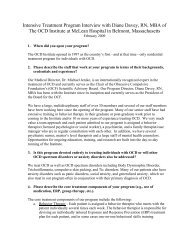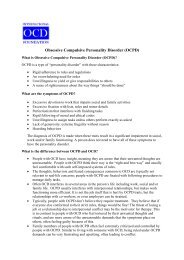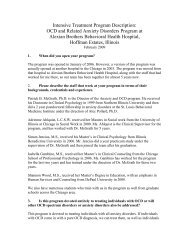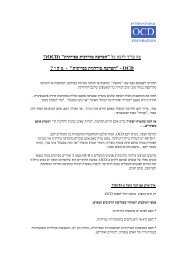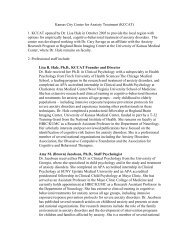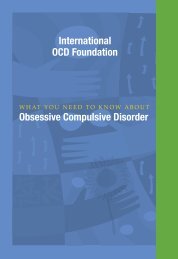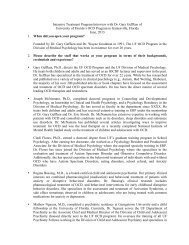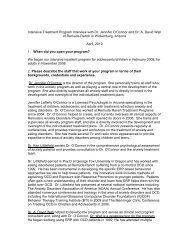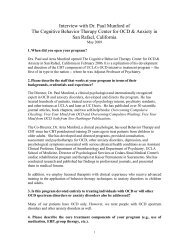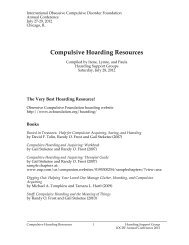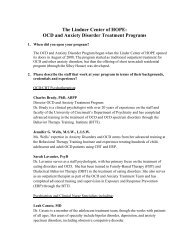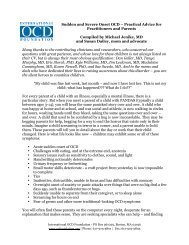Friday 8:00 am â 9:00 am - Obsessive Compulsive Foundation
Friday 8:00 am â 9:00 am - Obsessive Compulsive Foundation
Friday 8:00 am â 9:00 am - Obsessive Compulsive Foundation
Create successful ePaper yourself
Turn your PDF publications into a flip-book with our unique Google optimized e-Paper software.
Saturday 11:15 <strong>am</strong> – 12:45 pmTrack Title/Room Presenters DescriptionResearchersAdvances inUnderstanding thePhenomenology andTreatment of HoardingPotomac 2Kiara Timpano, PhD, Massachusetts GeneralHospital, Boston, MA; Jordana Muroff, PhD,Boston University School of Social Work, Boston,MA; Eric Storch, PhD, University of SouthFlorida Child & Adult OCD Treatment Progr<strong>am</strong>, St.Petersburg, FL; Dave Tolin, PhD, Anxiety DisordersCenter at The Institute of Living, Hartford, CTThis symposium will summarize and discuss recent advancesin our understanding of hoarding, and will focus in particularon the prevalence of hoarding, hoarding in children, and newtreatment advances.TherapistsOCD with Tourette’s:Comorbidity thatMattersPotomac 6Charles S. Mansueto, PhD, Behavior TherapyCenter of Greater Washington, Silver Spring, MDThis talk will address the varieties of complicating clinical featuresthat can result when OCD and tic disorders exist comorbidly. Dr.Mansueto will present a perspective on the OCD/TS interaction thatgoes beyond most current descriptions in the literature, suggestingthat a more complete understanding of interactional implicationsopens doors to a more thorough and nuanced understanding of OCDsubtypes and more effective treatment of these patients.TherapistsEnhancing TreatmentOutcomes for Difficultto Treat OCD: What,How and With Whom?Potomac 4Elna Yadin, PhD, University of Pennsylvania,Philadelphia, PAEdna B. Foa, PhD, University of Pennsylvania,Philadelphia, PAThis workshop will address obstacles encountered in the treatmentof patients with OCD including, but not limited to, overvaluedideation, poor or misplaced motivation, and diminished tolerancefor discomfort. Clinical case presentation from adults, adolescentsand children will be used to help identify barriers, provide somestrategies to address those, and increase the flexibility in treatmentoptions. Questions from participants will be encouraged.Ind. w/OCD& F<strong>am</strong>iliesWorking Together toQuiet OCD (Part 1)Regency CBarbara Van Noppen, PhD, University of SouthernCalifornia, Los Angeles, CAMichele Pato, MD, University of SouthernCalifornia, Los Angeles, CAThis is a 2 part workshop to identify and target common themes/patterns of behavior that are present in f<strong>am</strong>ilies dealing with OCD.The first part will be a presentation and a review of clinical findings.In part 2, (beginning at 1:45pm) we will offer an experientialworkshop for f<strong>am</strong>ilies to learn how to use behavioral contractingto reduce the impact of the OCD symptoms on personal and f<strong>am</strong>ilyfunctioning while fostering a supportive environment for ERP.Individualsw/OCDYes, There IS HelpFor Trichotillomaniaand Pathological SkinPicking!Regency ENancy J. Keuthen, PhD, OCD Clinic,Massachusetts General Hospital, Boston, MAMartin E. Franklin, PhD, University ofPennsylvania, Philadelphia, PAThis presentation will cover the standard CBT interventions for bodyfocusedbehavior disorders (e.g., habit reversal training and stimuluscontrol techniques), as well as more recent approaches (e.g., DBT)that can specifically address pulling and picking to modulate affector other uncomfortable sensations. The emphasis in this workshopwill be on providing attendees with concrete suggestions formanaging their pulling and picking behaviors.Kids/TeensKung Fu in theTreatment of OCDWashington ARenae M. Reinardy, PsyD, Lakeside Centerfor Behavioral Change; OCD Twin Cities,Minnetonka, MNIn this workshop, teens will learn how to bully their OCD. We will goover the types of OCD and discuss treatment approaches. We willalso talk about how to handle OCD at school and how best to dealwith symptoms at home. This is an informative and empoweringworkshop for teens only.Parents/F<strong>am</strong>iliesHelp for F<strong>am</strong>ilies withAdult Children withOCDWashington BPerrie Merlin, LICSW, OCD Institute, McLeanHospital, Belmont, MAThis talk will include what to do when “OCD” is ruining the f<strong>am</strong>ilydyn<strong>am</strong>ics, how to respond to a loved one who denies havingsymptoms or the need for treatment, how to help re-establish“normal” f<strong>am</strong>ily dyn<strong>am</strong>ics, how to access your own support network,and the importance of focusing on “level of functioning” as yourtarget. We will try to find a balance between understanding why yourloved one is at a stand-still and to leave you feeling that you stillhave options.GeneralImpulsivity vs.Compulsivity:<strong>Obsessive</strong> <strong>Compulsive</strong>Spectrum DisordersRegency FEda Gorbis, PhD, LMFT, Westwood Institute forAnxiety Disorders, Los Angeles, CAAttendees will learn the commonality and difference betweencompulsive and impulsive behaviors according to categorical vs.spectrum ideologies, become aware of the application of impulsivityvs. compulsivity to each OC spectrum disorder, and the associatedfeatures of each OC spectrum category, and acquire the strategiesand tools to treat impulsive behaviors and differentiate it from thetreatment of compulsive rituals.GeneralDon’t Try Harder, TryDifferent: A StressManagement Approachto Dealing With OCDRegency APatrick B. McGrath, PhD, Alexian BrothersBehavioral Health Hospital, Hoffman Estates, ILCome and hear a fun (yes, fun) way to approach stress managementand OCD. With the idea in mind that many people with OCD just keepon trying to do things over and over to get better (rituals), but still feelthe s<strong>am</strong>e day in and day out, this talk attempts to help individualscome up with new ways of coping with the stressors in their dailylives. There will be plenty of tips, ex<strong>am</strong>ples, and exercises that you canlearn and utilize to help you deal with stress so that you can hopefullyhave a clearer path toward challenging your OCD every day.– 28 –


